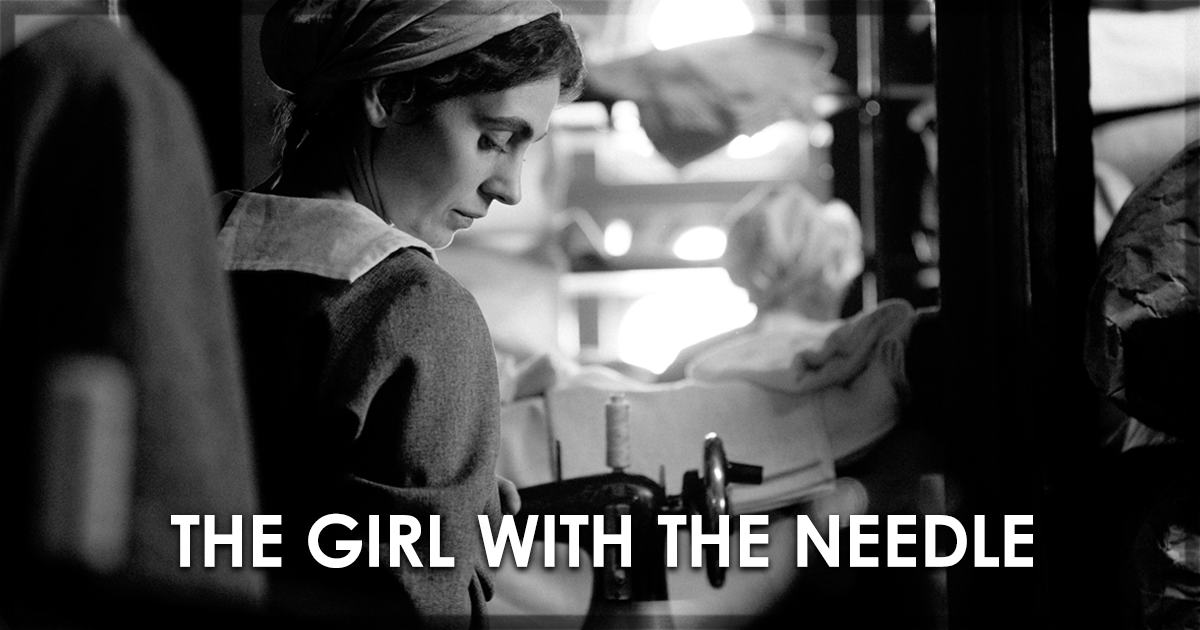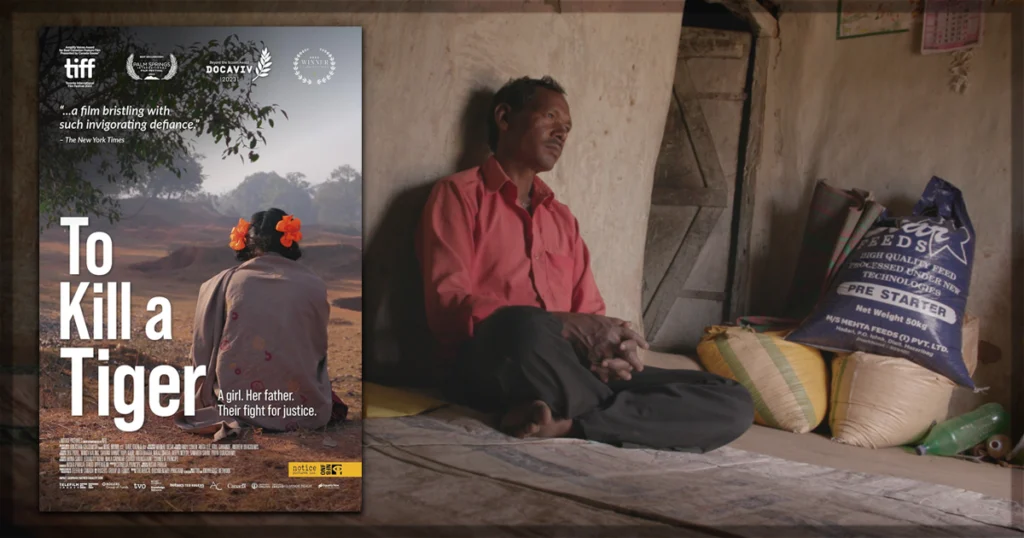The Girl with the Needle (Pigen med Nålen) is based on such a well-known criminal case in Denmark that mentioning the name of one of the characters is a local spoiler. For the rest of us, the horror must unspool the old-fashioned way as we watch a young woman’s truly desperate circumstances get worse and worse and worse. The choice to film in (gorgeous, layered, crisp) black and white means the horror retains its bleakness as the story unfolds. But be warned: the plot involves casual harm to babies, making it almost unwatchable. This bleakness will limit the audience for The Girl with the Needle, but on the other hand, that same bleakness inspires so much empathy for the people involved that you honestly can’t look away.
It’s 1917 in Copenhagen, and Karoline (Vic Carmen Sonne) works as a machinist in a garment factory. As the movie opens, she’s evicted from her small two-room apartment for non-payment of rent. Her husband Peter, unusually for a Dane, joined up to fight in WWI, and she’s had no word from him in over a year, so she’s in deep financial trouble. Her disgusting new apartment involves a bitch of a landlady and no running water, either. As she can’t prove Peter is dead, she’s not entitled to the widow’s salary supplement, though when the factory owner, Jørgen (Joachim Fjelstrup), hears of her case, he’s sympathetic.
Soon, his sympathy extends to, well, making love to her in alleyways and buying her pretty dresses. It doesn’t sound like love between them, but it is until two things go wrong. Firstly, Peter (Besir Zeciri) comes home with a face so destroyed by mustard gas that he must wear a mask in public. But Karoline is pregnant with Jørgen’s child, so she feeds him some soup, tells him she doesn’t love him anymore, and throws him out. Everything is perfect for her until Jørgen’s mother calmly informs them that if they marry, he’ll lose the factory and be disinherited. Guess who Jørgen chooses. Oh, and Karoline is fired, of course.
It’s too late for a doctor, so Karoline does the only thing she can think of, which is to use a knitting needle on herself in a public bathhouse. But she is stopped by a stranger named Dagmar (Trine Dyrholm, who has won the Danish Oscar-equivalent prize for Best Actress *five* times), who has a surprisingly young daughter called Erena (Avo Knox Martin). Dagmar owns a candy shop but quietly informs Karoline she is also a baby broker, taking the unwanted or disabled infants of young or desperate mothers to sell to infertile wealthy couples. It’s all illegal, but business is booming, and she promises Karoline that if she keeps the pregnancy, she’ll help for a very reasonable fee. And Karoline, who ends up giving birth on a pile of potatoes on a factory floor, is desperate enough to believe her.
Director Magnus von Horn, who co-wrote the script with Line Langebek, didn’t need to try so hard to make Karoline sympathetic. Anyone who’s looked after a baby in modern luxury for even an hour can understand why caring for an unwanted one in an unheated apartment with no running water could be too much. Dagmar is the only person in Copenhagen who has shown Karoline any lasting kindness, so it’s wholly understandable that Karoline would be willing to tolerate some incredibly disturbing things when she starts to work in Dagmar’s house.
Those things mostly involve Erena and young Miss Knox Martin provides some images here that are the most profoundly haunting a person could ever see. These images are rivaled only by the life Peter builds for himself in a traveling circus as one of the freaks, displaying his ruined face for an audience gasping in horror under the sneers of the ringmaster. Michał Dymek’s cinematography begins with a montage of faces layered over each other with different shifting expressions that mutate between screams and jeers and weeping, immediately and clearly setting letting us know what awaits, but for the most part, the images are presented without comment, for us in the audience to grasp their full importance by ourselves.
Ms. Sonne’s haunted facial expressions ensure Karoline’s determination to survive, which goes a very long way to making The Girl with the Needle a positive cinematic experience. And Ms. Dyrholm brings every ounce of her gravitas and expertise to the part of a woman who decided long ago she is a good person, and therefore every decision she makes is the right one, no matter how the world might judge her. It’s a bravura performance, made even bolder by some nude scenes and a wholly clothed sex scene involving a much younger man. As much as we all love Meryl Streep, she’d never.
The entire movie is so up-and-down courageous that it’s no surprise it’s in the main competition of the Cannes Film Festival, though its difficult subject matter means it’s unlikely to win any of the awards. There should never be a subject matter that’s taboo to discuss, though The Girl with the Needle comes very close. It’s just that we were all helpless babies ourselves once, so what happens to the little lives in this one is that everyone’s worst nightmare has come true.
The Girl With the Needle/Pigen med Nålen is now playing at the Cannes Film Festival.
Learn more about the film at the Cannes Film Festival page for the title.
You might also like…
‘Kingdom of the Planet of the Apes’ Movie Review: Disney’s Take
‘To Kill A Tiger’ Documentary’ Review: A Journey of Human Resistance and Justice



